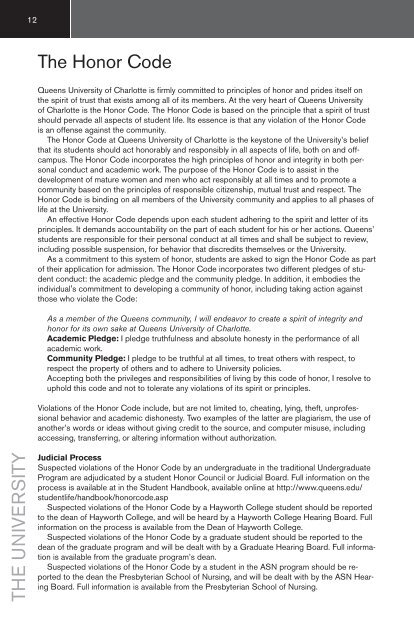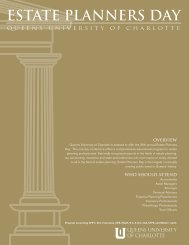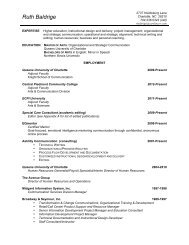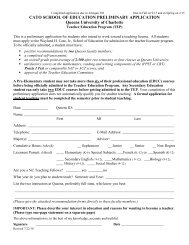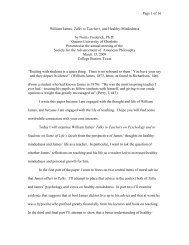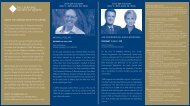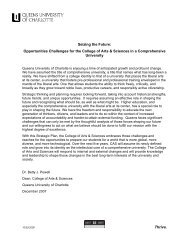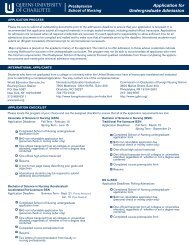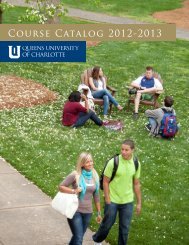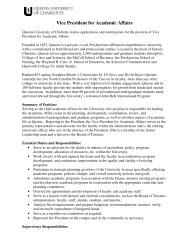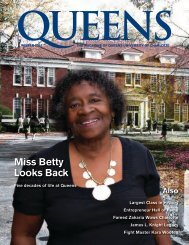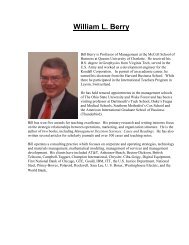2008-2009 Academic Catalog - Queens University of Charlotte
2008-2009 Academic Catalog - Queens University of Charlotte
2008-2009 Academic Catalog - Queens University of Charlotte
You also want an ePaper? Increase the reach of your titles
YUMPU automatically turns print PDFs into web optimized ePapers that Google loves.
12<br />
The Honor Code<br />
<strong>Queens</strong> <strong>University</strong> <strong>of</strong> <strong>Charlotte</strong> is firmly committed to principles <strong>of</strong> honor and prides itself on<br />
the spirit <strong>of</strong> trust that exists among all <strong>of</strong> its members. At the very heart <strong>of</strong> <strong>Queens</strong> <strong>University</strong><br />
<strong>of</strong> <strong>Charlotte</strong> is the Honor Code. The Honor Code is based on the principle that a spirit <strong>of</strong> trust<br />
should pervade all aspects <strong>of</strong> student life. Its essence is that any violation <strong>of</strong> the Honor Code<br />
is an <strong>of</strong>fense against the community.<br />
The Honor Code at <strong>Queens</strong> <strong>University</strong> <strong>of</strong> <strong>Charlotte</strong> is the keystone <strong>of</strong> the <strong>University</strong>’s belief<br />
that its students should act honorably and responsibly in all aspects <strong>of</strong> life, both on and <strong>of</strong>fcampus.<br />
The Honor Code incorporates the high principles <strong>of</strong> honor and integrity in both personal<br />
conduct and academic work. The purpose <strong>of</strong> the Honor Code is to assist in the<br />
development <strong>of</strong> mature women and men who act responsibly at all times and to promote a<br />
community based on the principles <strong>of</strong> responsible citizenship, mutual trust and respect. The<br />
Honor Code is binding on all members <strong>of</strong> the <strong>University</strong> community and applies to all phases <strong>of</strong><br />
life at the <strong>University</strong>.<br />
An effective Honor Code depends upon each student adhering to the spirit and letter <strong>of</strong> its<br />
principles. It demands accountability on the part <strong>of</strong> each student for his or her actions. <strong>Queens</strong>’<br />
students are responsible for their personal conduct at all times and shall be subject to review,<br />
including possible suspension, for behavior that discredits themselves or the <strong>University</strong>.<br />
As a commitment to this system <strong>of</strong> honor, students are asked to sign the Honor Code as part<br />
<strong>of</strong> their application for admission. The Honor Code incorporates two different pledges <strong>of</strong> student<br />
conduct: the academic pledge and the community pledge. In addition, it embodies the<br />
individual's commitment to developing a community <strong>of</strong> honor, including taking action against<br />
those who violate the Code:<br />
As a member <strong>of</strong> the <strong>Queens</strong> community, I will endeavor to create a spirit <strong>of</strong> integrity and<br />
honor for its own sake at <strong>Queens</strong> <strong>University</strong> <strong>of</strong> <strong>Charlotte</strong>.<br />
<strong>Academic</strong> Pledge: I pledge truthfulness and absolute honesty in the performance <strong>of</strong> all<br />
academic work.<br />
Community Pledge: I pledge to be truthful at all times, to treat others with respect, to<br />
respect the property <strong>of</strong> others and to adhere to <strong>University</strong> policies.<br />
Accepting both the privileges and responsibilities <strong>of</strong> living by this code <strong>of</strong> honor, I resolve to<br />
uphold this code and not to tolerate any violations <strong>of</strong> its spirit or principles.<br />
Violations <strong>of</strong> the Honor Code include, but are not limited to, cheating, lying, theft, unpr<strong>of</strong>essional<br />
behavior and academic dishonesty. Two examples <strong>of</strong> the latter are plagiarism, the use <strong>of</strong><br />
another’s words or ideas without giving credit to the source, and computer misuse, including<br />
accessing, transferring, or altering information without authorization.<br />
THE UNIVERSITY<br />
Judicial Process<br />
Suspected violations <strong>of</strong> the Honor Code by an undergraduate in the traditional Undergraduate<br />
Program are adjudicated by a student Honor Council or Judicial Board. Full information on the<br />
process is available at in the Student Handbook, available online at http://www.queens.edu/<br />
studentlife/handbook/honorcode.asp<br />
Suspected violations <strong>of</strong> the Honor Code by a Hayworth College student should be reported<br />
to the dean <strong>of</strong> Hayworth College, and will be heard by a Hayworth College Hearing Board. Full<br />
information on the process is available from the Dean <strong>of</strong> Hayworth College.<br />
Suspected violations <strong>of</strong> the Honor Code by a graduate student should be reported to the<br />
dean <strong>of</strong> the graduate program and will be dealt with by a Graduate Hearing Board. Full information<br />
is available from the graduate program’s dean.<br />
Suspected violations <strong>of</strong> the Honor Code by a student in the ASN program should be reported<br />
to the dean the Presbyterian School <strong>of</strong> Nursing, and will be dealt with by the ASN Hearing<br />
Board. Full information is available from the Presbyterian School <strong>of</strong> Nursing.


